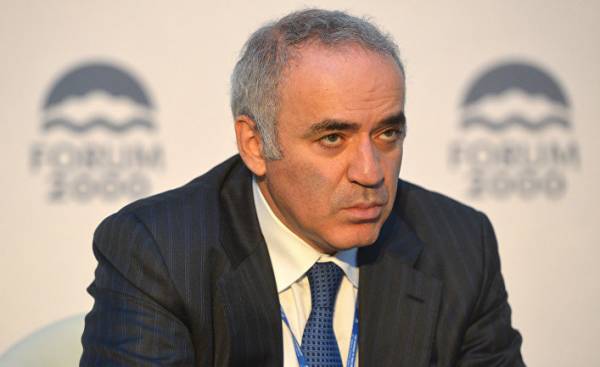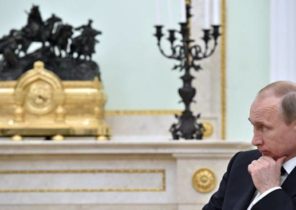
Since 2002, a former world champion and Kasparov Chess Foundation are trying to bring this discipline in educational systems around the world. This month it launches a program designed for French-speaking countries.
Over the past 15 years, Garry Kasparov has launched with 3 thousand 500 schools around the world, to give them their passion for chess. Recently he was passing through Paris for the launch of programs in 11 Francophone Africa, including Senegal, Morocco, Madagascar and côte d’ivoire. Its goal is to prepare in five years a million new players. Interview with Garry Kasparov and Betaseron Gilles (Gilles Betthaeuser), the founder of the French mission of the Kasparov Chess Foundation.
Le Figaro: what is the goal of investment in education in Francophone countries?
Gilles, Betthauser: French-speaking countries were a natural continuation of the development of the Association. We began to put the chess on the primary role in the school system in 2002 in the United States. Our idea was to extend this approach to the most disadvantaged regions around the world. We believe that chess is Central to social cohesion and mental development. 2009-2010 we started in Europe with Croatia, where he lives, Garry Kasparov, as well as in Asia, Mexico and English-speaking Africa. We considered a logical continuation of the work in Africa, where the needs in terms of education is truly enormous. Our work with Francophone countries starts from Francophone Africa.
— What can you give chess a classical education?
Garry Kasparov: the Problem of schools that used methods do not develop. If people in 1960-ies was in 2017, he would be confused, because everything has changed. All except education. Today’s youth are pushed to entrepreneurship, to working in a group, to initiative. While in high school persist a unidirectional relationship between students and teacher. The game is a great way to keep students in the struggle with each other, to turn the classroom into an arena of confrontation where there is no hierarchy except the playing field. Besides, chess is like nothing else involve young people in the school.
— What are the mental qualities help to develop chess?
Garry Kasparov: For a start, the fastest run in age from six to nine years. It’s like learning a foreign language from an early age: everything is intuitive, natural way. Further, chess has often and justifiably draw a parallel with mathematics. In some schools with which we cooperate, chess even replaced one mathematics lesson. And it works! Their grades are better, because they develop mathematical logic, not understanding. Finally, they learn to make judgments. Students often bison lesson. In chess, on each turn, you may have five answers, and they all depend on the enemy. What consequences will the decision? That’s what they learn with this discipline.
French education, too, could look at your ideas, to bring back the interest of students for classes.
Garry Kasparov: there are a lot of schools that offer chess as a pedagogical solution. This is a good start. However, in France, we face certain difficulties. Apparently, the education Department is not too like the game in which ultimately there is a winner and a loser. We absolutely do not agree with this position because children need to be prepared in the future to stand up after defeat.
— You need to study hard to become a good chess player?
Garry Kasparov: it is Often interrelated. I am a good student, it’s hard to say otherwise. However, this is not inevitable. I think my subject will help students to improve their readings in other disciplines. And not just in math! Personally, I love to debate, write: chess does not drive me in a particular pattern of personality.
— Which countries are more willing to respond to your initiatives?
Garry Kasparov: In Egypt and South Africa, for example, chess is already included in custom. The British tradition has played a role, but it can be noted that the development of chess is not necessarily connected with the former colonies and protectorates, but mostly with the work of local federations, individual initiatives and policies conducted in the field. Sometimes we had great difficulty in trying to develop our projects in Africa, because we don’t know where to go: in the Federation, the sports Ministry or the Ministry of culture. And the rest, of the country’s chess remains Armenia, where this discipline is mandatory in school. But that’s only because President Serzh Sargsyan is President of the chess Federation of the country….
— Still no woman became the world chess champion. Young girls whom you can meet interested in chess?
Garry Kasparov: Chess reflect changes in society. For a long time this game was purely male. Matches not comply with the rules of female behavior. But of course everything changes! We see that boys in our schools are showing greater interest in the game than girls, but this gap is significantly reduced. At the international level, Hungarian Judith Polgar, the only woman included in the world ranking Top 10. (In 2005 it reached the maximum level, taking the 8th place among the men). She became an example for many women.
You became world famous thanks to the legendary matches with Microsoft software and Deep Blue Deeper Blue. Today, in the age of social networking, you offer students to fight with computer programs? In your opinion, in school education there computer?
Garry Kasparov: first, in most of the schools in which we implement our program, no computers or even electricity. So the question disappears by itself. In General, developing countries are already working with tablets in schools, and it was good. Chess became popular thanks to the Internet too. And I think it is interesting to give the opportunity for our youth to work on computers.







